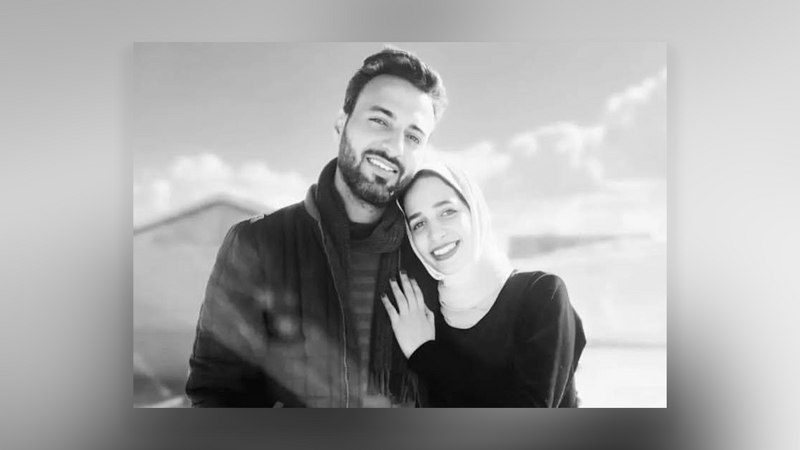The Electronic Intifada 23 January 2025

Ahmed al-Zaharna and his fiancée Hadil Nasman.
In the unforgiving winter cold in Gaza, just as hope for a ceasefire had started sprouting, my work as a volunteer doctor in the southern parts of the besieged coastal territory had seen me relocated yet again.
I found myself stationed at Nasser Medical Complex in Khan Younis, where tragedy once again became an uninvited guest.
On the morning of 27 December, we received the body of Ahmed al-Zaharna, 35, a fellow medical worker. Ahmed, a nurse devoted to saving lives, who was found frozen to death in his tent in the Mawasi area, west of Khan Younis.
He had been working tirelessly between the Gaza European Hospital and a Red Cross field hospital, offering solace and aid to those ravaged by war.
I knew Ahmed not just as a colleague but through my close friend, Hadil Nasman, his fiancée. Less than a month ago, they had celebrated their engagement – a glimmer of love amidst the ruins.
Ahmed had chosen Hadil, a 27-year-old nurse, as his partner to weather life’s storms together. Their love story was one of quiet beauty, with dreams of building a warm home and raising children in peace after the war’s end.
But life in Gaza spares no dreams. Ahmed had left the hospital after a long shift, kissed his beloved goodbye, and sought rest in the only space he could call his own, a makeshift tent.
The biting cold of the night, however, proved merciless. By morning, Ahmed’s neighbors found him lifeless, his lips blue, his body stiff from the unrelenting chill.
Hunger
The news shattered Hadil. She stood frozen when we received Ahmed’s body in Nasser hospital’s morgue. Her tears fell silently as she stared at the man she had loved and planned a future with, now reduced to another statistic in Gaza’s ever-growing list of the dead.
I cannot find the words to console her. How does one reconcile with the death of a man who dedicated his life to saving others? How does one grieve in a world where Ahmed’s death passes unnoticed as just another tragedy in a land accustomed to loss?
While the world celebrated Christmas, Ahmed froze to death in a tent without even a blanket to shield him.
The same bitter cold that claimed Ahmed’s life, also came for eight infants, who all perished in Gaza’s displacement camps in just a month.
Their parents, like thousands of displaced families, live in makeshift tents that offer no reprieve from the biting winds.
Then there is the hunger.
On 10 January, we heard of the death of 5-year-old Abdul Rahman Nabil Nabhan in a school shelter in central Gaza’s Nuseirat refugee camp.
Abdul Rahman lost his life during a mass scramble at a communal kitchen and food distribution point.
In the melee, the child fell into a boiling pot, and suffered third-degree burns. He was admitted to the intensive care unit, teetered on the edge of death and endured relentless agony.
Then he died.
Hunger, cold, the deliberate targeting of Gaza’s healthcare system.
The blockade; the cutting of food, water, electricity and fuel for 2.3 million people.
The incessant and indiscriminate bombardment. The total devastation, leaving 1.9 million people homeless.
The killings. So many killings.
This is what genocide looks like
Complicit indifference
Even though my daily work is in the hospital, surrounded by death and suffering, there are moments when the weight becomes unbearable.
On the morning of 27 December I cried silently, hiding my tears from others. It wasn’t just Ahmed or the children – it was the unshakable feeling of helplessness, the piercing question of who might be next.
Ahmed was not just a nurse, and the children were not just statistics. They were people with dreams, futures and stories that deserved to unfold.
There is a ceasefire now. Fifteen months after this brutality started, those of us who have survived may be able to enjoy some relief from an enemy that weaponized food, that weaponized water and that weaponized the weather.
But not Ahmed. Not Hadil. Not Abdul Rahman. And not the countless unnamed victims of cold and famine and outsized violence and the indifference of the world.
Shrooq Hijazi is a volunteer doctor in Gaza.





